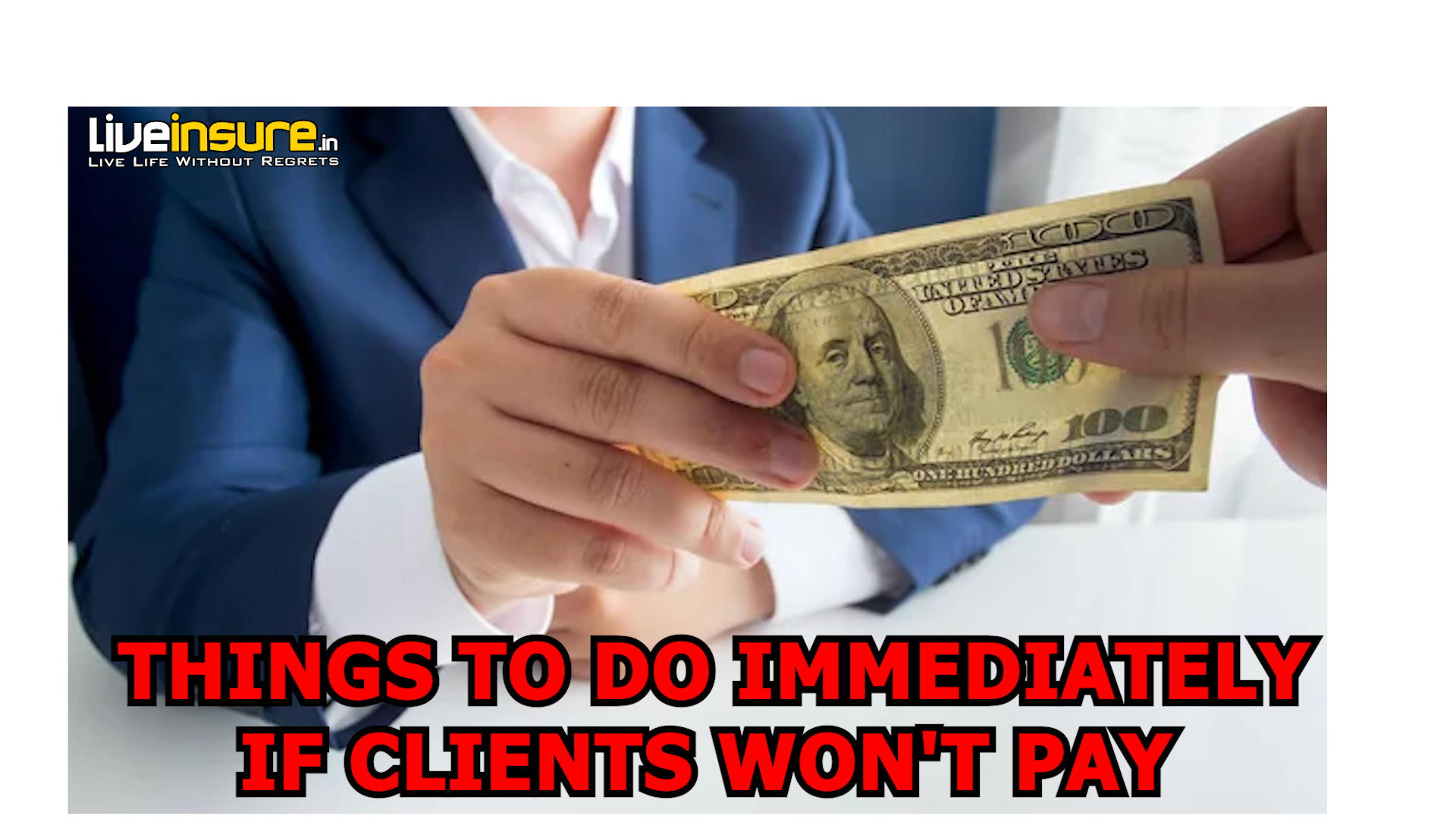It’s been over a month, the invoice is due but your client is ghosting you and you have no idea what to do when a client doesn’t pay – a tale as old as trade. Truth is, it can happen to anyone, regardless if you’re inexperienced or seasoned.
Some business owners learn how to collect money from clients the hard way. However, you get the privilege to learn from their mistakes and be prepared when a situation like this happens, because trust us, it will at some point. Especially in an economic crisis like this, when everyone is facing a shortage of cash.
Several entrepreneurs who learned their lessons the hard way were willing to share their insights and tips on dealing with clients who refuse to pay. There were some radical answers involving baseball bats, but we left them out and you should too.
1. Get in touch with non-paying clients
The very first thing that you should do when a client misses a payment is to get in touch. There are many legitimate reasons why a customer could forget to pay an invoice, such as:
- Losing or failing to receive the initial invoice
- Personal issues, like a family emergency
- Being away for work or travel
- An incorrect email address or billing address
Often, clients don’t miss payment due dates on purpose. By reaching out to them, you can give them a polite and gentle reminder to pay without going overboard. Start by reaching out through the original method of communication you used while on the job (like phone calls, texts, or emails). If you don’t hear back, try any other contact information you have on file.
If a client is in an unexpected situation that makes it hard for them to pay their invoice in full, consider working out a payment plan together. It’s better to get paid in installments than not at all, and your client will appreciate your understanding and flexibility.
3. Use structured payment reminders
It can be hard to get the messaging right, especially when you’re frustrated and don’t know what to say. Instead of winging it and sending out a message that you may come to regret, use payment reminder templates.
Here are four payment reminder templates you can save and use for when a customer hasn’t paid their invoice.
Keep copies of all communication you have with a client before, during, and after a job in case you need to use them in the future.
4. Pursue legal action
If you’ve done your best to get in touch, resent invoices, and reached out with reminders but the customer still won’t pay, it may be time to end the working relationship and pursue legal action.
Your first option is to hire an attorney to reach out to the client on your behalf. They can send a letter requesting immediate payment, including copies of the initial contract and invoices as proof of the terms of the agreement between you and the client. A lawyer can also help if you choose to move forward with a lien or lawsuit against the client who is refusing to pay.
If that doesn’t work, you may choose to take your case to small claims court, which, depending on your state, you can do with or without a lawyer. However, each state has a minimum amount (usually $2000.00) you need to sue for in order to ensure that the case is worthwhile. So, if you’re looking to collect on a smaller amount, like $500.00, you may not be able to present your case to a judge.
Legal action, like hiring an attorney or taking your case to small claims court, costs money. You should only resort to legal action for large jobs and invoices. Otherwise, you may end up spending more to collect payment than the cost of the job itself.
5. Hire a collection agency
Collection agencies typically handle debts that are 90+ days past due. If you’ve exhausted options #1-3 and determined that legal action isn’t worth it, hiring a collection agency may be a good option for you.
Collection agencies work by charging you either a percentage of the debt or a flat fee per account that you need them to collect on. Collection agencies can be ideal if you’re strapped for time or if you aren’t confident you know the rules and regulations surrounding debt collection in your state. For example, when and how you’re allowed to call a client whose invoice is outstanding.
Before you choose a collection agency, make sure to do your research by finding one that:
- Has experience making collections in your industry
- Is recommended by your colleagues or industry contacts
- Is licensed and bonded in your state
- Behaves professionally and within your state’s collection regulations
6. Research the client
Before doing anything else, the company suffering from the situation where the client does not pay(what to do when a client doesn’t pay in India?) must research about the background of the client. They could Google their name, ask their contacts if they know anything about their new prospect, and look if there are any similar complaints against them on those sites.
7. Discuss before signing the contract
At the end of all the sweet and polite conversations with the clients, this is all a business deal. It’s crucial for any company to discuss all the cost and the expected payment dates with the client and must mention all the payment conditions while signing the contract. Business is all about written proof. The company should say all the details regarding everything, even small ones too.
8. Send invoices right away.
With so many tasks on the plate as a business owner, it can be easy to lose track of a customer invoice. They may even forget to send one in the first place, and going after a client for payment on a bill the person never sent will only hurt the reputation. So, what to do when a client doesn’t pay in india? It is advised to send an invoice for the non payment of invoice law India as soon as a job is completed and stay on top of it until it’s closed out to avoid falling behind.
9. Ask politely first
Where is dealing with clients who refuse to pay or do not pay on time or what to do when a client doesn’t pay in India? Then Questions related to payment must be asked in a friendly manner first. Nobody should use any harsh or rude words. It can hurt the feelings of the client. Even if they are a little late there could be a reason behind it, specifically in a case where the relationship between the client and the company is old. Communicating regarding the late payment could help to solve the issue.
10. Charge Late Fees
Every business is always ought to charge late fees for unpaid invoices(non payment of invoice law India). It needs to set up a fee structure for defaults in payment that can be used on every client, ideally as a written policy in the contract invoices for the non payment of invoice law India. Such a step should be taken early, within 10 or 15 days after an invoice goes unpaid(non payment of invoice law India). The company can send a message beforehand that because the invoice has gone unpaid for so long which tends to non payment of invoice law India, add a late fee if it isn’t paid within 48 hours, or something similar. These late fees have to be continuously tracked if the clients still haven’t paid after a reminder or when dealing with clients who refuse to pay.
11. Stop Working
Even after multiple follow-ups, if there is no response from the clients’ side, the company should stop working on their projects. Withdrawal of working terms, in such case, is necessary to avoid further payment defaults and capital imbalance.
Having covered any or every step aforesaid, if the client still does not pay, it’s time to take some legal action against them(legal action for non payment of invoices in India). Putting the matters into the discretion of a judiciary authority is the ultimate option to excavate money from flaky clients.
Out Of Court Settlements
If the court proceedings are taking too much time. Then parties can go for the quickest and most simple methods for recovering money. That is to choose an out of court settlements. Like arbitration, mediation or conciliation. In this out of court settlements, both the parties are given chance to put their conditions in front of the arbitrator. Arbitrator helps to come to a settlement which can be accepted or rejected by any of the parties. If the parties reject the settlement then the case will again goes to the court for settlement. And if the parties accepts it then they have to follow that settlement.
So, these are the provision on which a seller can take legal action(legal action for non payment of invoices in India) if the customer delays payment. All the legal action(legal action for non payment of invoices in India) should be done by an advocate. You should always take professional help.
How to take legal action for nonpayment
When debt is significant enough, taking clients to small claims court or hiring an attorney may be viable options for getting paid.
“We do a very honest cost analysis when considering a lawsuit,” Giordano said. “Is the total cost (financial, emotional, time, energy, etc.) greater than the amount to be recovered? If it’s more work to recover the $500 than it’s worth, just learn the lesson, put in a system so it doesn’t happen again, and move on.”
However, if that client owes you a large sum of money and refuses to pay you or a collection agency based on the terms of your contract or invoice, a lawsuit may be necessary. If you decide to pursue legal action, consult an attorney to determine how to proceed.
Taking a client to small claims court is never a fun process, and it requires a lot of work, such as filing a complaint, preparing your case, presenting your case and collecting a judgment. Thus, the amount of money you’d be suing for needs to be enough to be worth your time and meet your state’s requirements. (Typically, the minimum is $2,000.)
“Small claims court is particularly well suited to collecting small debts because it’s inexpensive and fairly quick,” said freelance legal writer Stephen Fishman. “In fact, debt collection cases are by far the most common type of cases heard in small claims court. And you don’t need a lawyer to bring your case. Indeed, a few states – including California and Michigan – don’t allow anyone to be represented by a lawyer in small claims court.”
Conclusion
These are all things that can help you get paid faster and better. If you want to succeed as a freelancer, it’s important to learn how to get clients to pay their bills quickly.




